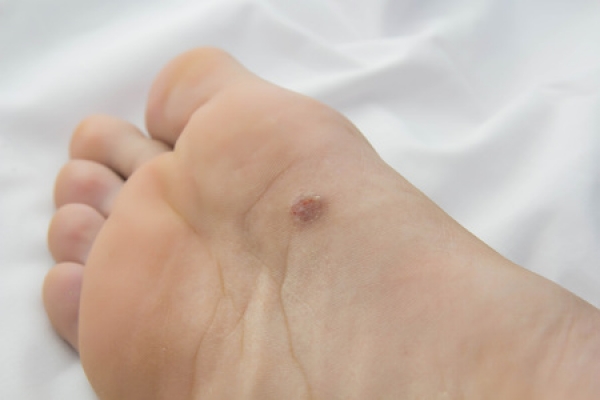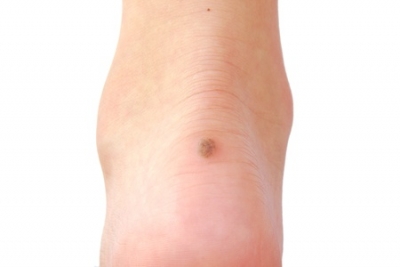Connect With Us
Blogs

Skin Cancer (3)
At Superior Foot & Ankle Care Center we know that our Los Angeles County patients enjoy the sun nearly year-round, but May is Skin Cancer Awareness Month and a good time to emphasize the importance of protecting your skin from the harmful effects of UV rays.
Research shows that currently one in five people will develop some form of skin cancer by the age of 70. In fact, there are more cases of skin cancer diagnosed each year than all other cancers combined. But skin cancer is also highly treatable and has a very high rate of survival when detected early. Below are steps you can take to lower your risk for this potentially deadly disease.
Be on the Lookout—one big advantage of skin cancer over other carcinomas is that you can see it. Commit to inspecting the skin on your feet and the rest of your body monthly. The Skin Cancer Foundation suggests that you lookout for:
- New—blemishes, freckles or moles that have appeared that weren’t present before
- Changing—growing larger, losing their borders, becoming mottled or containing new colors could all signal a potential cancer
- Unusual—any mark on your skin that bleeds, crusts over or is itchy or sore for more than three weeks
When it comes to your feet, be sure to look at the tops and the soles of your feet and between each toe. Look for spots on your nails or in the skin under the nail as well. If you see anything you’re concerned about, contact our Long Beach office at (562) 420-9800 to schedule an appointment with our podiatrists, Dr. Victoria M. Foley and Dr. Constance Ornelas, promptly.
Take Cover—seek shade during the hottest hours of 10 a.m. – 4 p.m. If you spend a large amount of time in the sun or are extra fair, freckled or have other issues that increase your risk for skin cancer consider shirts, hats and other clothing made with UPF (ultraviolet protection factor).
Be Generous with the Sunscreen—many patients often skip their feet when applying sunscreen but it’s just as essential there as any exposed skin. And not just when you are at the beach or pool. If you’re wearing open sandals for a day of shopping or running errands be sure to apply a broad-spectrum sunscreen with an SPF of 15 or higher about 30 minutes before going out. If you’re playing sports or swimming, choose a water-resistant variety and reapply after coming out of the water or every two hours.
Say No to Tanning Beds—these increase your risk for all types of skin cancer including dangerous melanomas by up to 75%. Even one time can increase your risk. Don’t let teens use tanning beds ever.
You can decrease your risk of skin cancer. If you have any questions about this disease and your feet, don’t hesitate to contact us.
Did you know that over 5 million cases of skin cancer are diagnosed each year? In fact, it’s the most common kind of cancer. At Superior Foot & Ankle Care Center we want to draw attention to this condition because, while the skin on your feet is just as susceptible as that on the rest of your body, many patients don’t think of their feet as a possible site for skin cancer.
Protect and Detect
The good news is that skin cancer is also one of the most preventable forms of cancer. It’s estimated that nearly 90% of nonmelanoma skin cancers and 85% of melanomas are caused by exposure to ultraviolet radiation from the sun. There are some simple ways you can greatly reduce or eliminate your risk of danger from the sun’s rays:
- Apply a broad-spectrum sunscreen that protects against UVA and UVB rays and that has an SPF of 15 (30 is even better if you will be out for a long period of time). Use sunscreen on your feet even if you will just be out for a day of shopping and are wearing sandals or other open-style shoes that expose the skin on your feet.
- At the beach or pool, apply sunscreen to the tops and bottoms of your feet. Reapply every two hours and after swimming or excessive sweating.
- Never use UV tanning beds.
- Try to avoid the sun when it is at its strongest: between 10 a.m. and 4 p.m.
One of the most important ways to protect yourself is by conducting regular self-exams of your skin. For your feet, this means examining both the tops and bottoms. Be sure to also take the time to look between your toes. If you have any moles or freckles, note any changes in them. It’s helpful to remember the ABCD method of evaluating skin spots. Danger signs include:
A—asymmetrical shape
B—borders that are uneven
C—colors that are mottled or multiple colors in one mole
D—diameter larger than ¼ inch (about the size of a pencil eraser)
If you notice anything suspicious looking on the skin of your feet, contact our Long Beach office (562-420-9800) for an appointment so that our podiatrists, Dr. Victoria M. Foley or Dr. Constance Ornelas can examine your examine your feet and determine if further testing or evaluation is needed.
May is Skin Cancer and Melanoma Awareness Month and we at Superior Foot & Ankle Care want to remind our patients that here in sunny Long Beach, CA we are exposed to the sun’s harmful rays for much of the year. Protecting your skin isn’t just something you need to think about when you’re heading to the beach for the day. Protecting the skin on your feet is just as important as the skin on the rest of your body. Did you know that between 3-15% of all melanomas occur on the feet? The sad fact about foot cancers is that they are often not detected in their earliest stages because patients don’t think to look for them there. Below are some common questions about skin cancer to help raise awareness about this disease:
Isn’t it better to get a base tan before vacation rather than spend more hours in the sun?
Using indoor tanning beds increases the risk of melanoma by 74%, squamous cell cancer by 67% and basal cell cancer by 29%. Tanning beds irradiate your body with ultraviolet radiation which is a carcinogen—whether it comes from the sun or a tanning machine. There is no safe level!
Is using a self-tanner safe?
Yes! And, it’s a great way to get the tan look you love without the danger of skin cancer. Self-tanning has come a long way. For a special occasion, you may want to splurge on a professional spray tan but there are plenty of home products that also produce a natural, even-looking tan. Remember to still apply sunscreen as self-tanners do not provide sun protection.
Do laser treatments cause skin cancer?
There are many different types of laser treatments available today that are used to reverse the effects of sun damage and also to treat wrinkles and fine lines. These do not increase the risk of skin cancer and in fact, can reduce risk by treating pre-cancerous lesions.
What are other good ways to prevent skin cancer on my feet?
Use a broad spectrum, water-resistant sunscreen that protects against both UVA and UVB rays. Reapply every two hours and always after swimming. Avoid being out during the hottest times of the day—10 a.m. – 4 p.m.
Be diligent about checking your feet and the rest of your body for changes in spots or moles. Those that are multi-colored, asymmetrical, larger in diameter than ¼ inch, have irregular borders or have started bleeding, itchy or flaking should be reported to our podiatrists, Dr. Victoria Foley and Dr. Constance Omelas immediately. Make an appointment by calling: (562) 420-9800.



